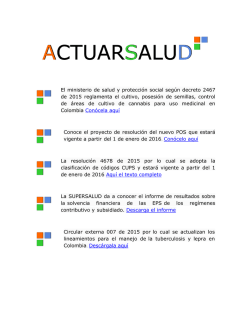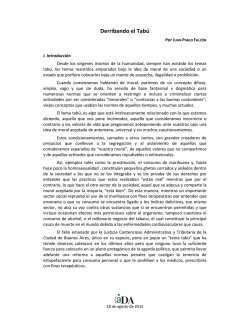
prospective cohort study, 2014, European College of
A) Estudios y Evidencias en el uso de Cannabis y su regulación en la cual se sustenta el contenido del video. 1. “Completo meta-análisis realizado por International Centre for Science and Drug Policy sobre estado de la evidencia en uso de cannabis y regulación” Dan Werb, Tara Marie Watson, Naslee Maghsoudi, Estado de evidencia del uso de Cannabis, 2015, International Centre for Science and Drug Policy. 2. “ Científicos británicos demuestran en una investigación que el cannabis no influye en la capacidad intelectual de una persona, los resultados invalidan los de otro estudio realizado hace dos años en la Universidad de Duke” C. Mokrysz1, S. Gage, R. Landy, M.R. Munaf`o, J.P. Roiser, H.V. Curran , Neuropsychological and educational outcomes related to adolescent cannabis use, a prospective cohort study, 2014, European College of Neuropsychopharmacology, University College London, Clinical Psychopharmacology Unit, London, United Kingdom; University of Bristol, School of Social and Community Medicine, Bristol, United Kingdom; Wolfson Institute of reventive Medicine, Centre for Cancer Prevention, London, United Kingdom; University of Bristol, School of experimental Psychology, Bristol, United Kingdom; University College London, Institute of cognitive Neuroscience, London, United Kingdom. 3. “Estudio muestra que consume de cannabis en adolescentes no está relacionado con un menor Coeficiente Intelectual.” Ole Rogeberg, Correlations between cannabis use and IQ change in the Dunedin cohort are consistent with confounding from socioeconomic status, The Ragnar Frisch Centre for Economic Research, 2012, Edited by Leslie Lars Iversen, University of Oxford, Oxford, United Kingdom. 4. “Uso de cannabis no está asociado con cambios morfológicos en el cerebro de jóvenes y adultos” Barbara J. Weiland, Rachel E. Thayer,Brendan E. Depue, Amithrupa Sabbineni, Angela D. Bryan, and Kent E. Hutchison, Daily Marijuana Use Is Not Associated with Brain Morphometric Measures in Adolescents or Adults, 2015, Department of Psychology and neuroscience, University of Colorado Boulder, and Department of Psychological and Brain Sciences, University of Louisville, Louisville. 5. “Estudio de Harvard muestra que no hay relación de causalidad entre uso de cannabis y esquizofrenia o eventos psicóticos” Ashley C. Proal, Jerry Fleming, Juan A. Galvez-Buccollini, and Lynn E. DeLisi, A Controlled Family Study of Cannabis Users with and without Psychosis, 2015, Harvard Medical School, Boston, Veterans Administration Boston Healthcare System, Brockton, MA. 6. “Estudio compara el riesgo de alcohol, tabaco y cannabis para la salud: los dos primeros implican un riesgo muy superior al del cannabis” Dirk W. Lachenmeier, Jurgen Rehm, Comparative risk assessment of alcohol, tobacco, cannabis and other illicit drugs using the margin of exposure approach, 2015, Epidemiological Research Unit, Technische Universita Dresden, Klinische Psychologie & Psychotherapie, Dresden, Germany, Chemisches und Veterinaruntersuchungsamt, Germany, Social and Epidemiological Research Department, Centre for Addiction and Mental Health, Toronto, Canada, Institute of Medical Sciences, University of Toronto, Toronto, Canada, Dalla Lana School of Public Health, Toronto, Canada, Dept. of Psychiatry, Faculty of Medicine, Toronto, Canada, WHO Collaborating Centre for Mental Health & Addiction, Toronto, Canada. 7. “El uso de marihuana en adolescentes no está vinculado a depresión, cáncer de pulmón u otros problemas de salud”. Jordan Bechtold, Theresa Simpson, Helene R. White, Dustin Pardini, Chronic Adolescent Marijuana Use as a Risk Factor for Physical and Mental Health Problems in Young Adult Men, 2015, University of Pittsburgh School of Medicine, Rutgers University, University of Pittsburgh Medical Center. 8. “La droga de inicio es el alcohol y no el cannabis” Kirby T, Barry AE. Alcohol as a gateway drug: a study of US 12th graders. Journal School of Health, American School Health Association, 2012; 82: 371-379. 9. “El uso de cannabis no aumenta debido a la regulación” Substance Abuse and Mental Health Services Administration, Results from the 2013 National Survey on Drug Use and Health: Summary of National Findings: Substance Abuse and Mental Health Services, 2014. B) Estudios y evidencia sobre uso medicinal del Cannabis en los que se sustentan el contenido del video. 1. Base de datos de estudios y casos clínicos. 2011, International Association for Cannabinoid Medicines. 2. J. Michael Bostwick , Blurred Boundaries: The Therapeutics and Politics of Medical Marijuana, 2012, Mayo Clinic. 3. Mark A Ware, Dra. Julie Desroches, Cannabis medicinal y Dolor, International Association for the study of pain, 2014, Pain Management Unit McGill University Health Centre, Montreal (Quebec) Canadá, , Faculty of Medicine Université de Montréal. 4. - Daniel Friedman, Orrin Devinsky, Cannabinoids in the Treatment of Epilepsy, Department of Neurology, New York University Langone School of Medicine, New York, 2015, The new england journal of medicine. - Shaun A. Hussain ⁎, Raymond Zhou, Catherine Jacobson, Julius Weng, Emily Cheng, Johnson Lay, Phoebe Hung, Jason T. Lerner, Raman Sankar, Perceived efficacy of cannabidiol-enriched cannabis extracts for treatment of pediatric epilepsy: A potential role for infantile spasms and Lennox–Gastaut syndrome Division of Pediatric Neurology, Mattel Children's Hospital at UCLA, David Geffen School of Medicine, Los Angeles, CA, USA. 5. “En un 25% han bajado las muertes por sobredosis de analgésicos de origen opioide en los estados que han legalizado el cannabis medicinal “ Marcus A. Bachhuber; Brendan Saloner; Chinazo O. Cunningham, Colleen L. Barry, Medical Cannabis Laws and Opioid Analgesic Overdose Mortality in the United States, 1999-2010.
© Copyright 2026

